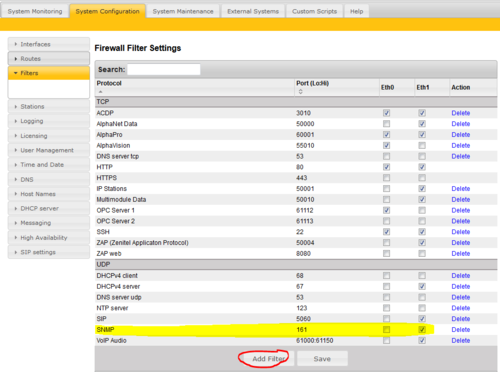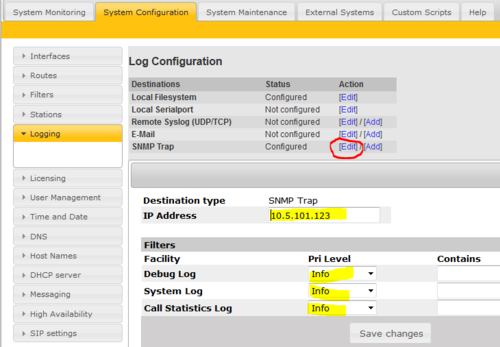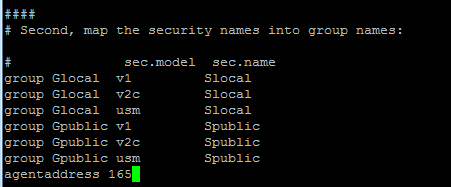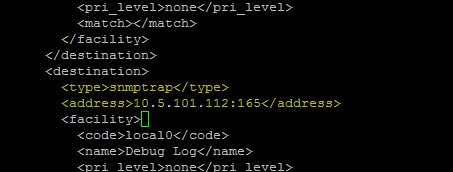SNMP in AlphaCom XE: Difference between revisions
From Zenitel Wiki
| Line 103: | Line 103: | ||
'''Revision 1:''' | '''Revision 1:''' | ||
* OID: enterprises.9362 | * OID: enterprises.9362 | ||
<br> | |||
== Frequently asked questions on SNMP == | == Frequently asked questions on SNMP == | ||
Revision as of 12:49, 19 September 2018
The AlphaCom XE runs a SNMP service, and supports SNMP polling and SNMP traps.
The main difference between a SNMP poll and a SNMP trap is which device initiates the communication. An SNMP poll is initiated by the SNMP server and the AlphaCom responds to the server. An SNMP trap is initiated by the AlphaCom when it has information to send (usually some event happened) and does not want to wait for the server to ask for information.
Stentofon MIB OID numbers
Zenitel Norway AS has assigned a Private Enterprise Number OID 26122.
The Zenitel Norway AS enterprise number is labeled enterprises.stentofon
Allocated Sub OIDs:
- 1 - enterprises.stentofon.alphacom
- 2 - enterprises.stentofon.ipstation
Note that the AlphaCom OID has of historical reasons not always followed the enterprise numbering defined above, see AlphaCom_MIB_revisions
SNMP polling
In addition to the AlphaCom MIB, the standard MIBs mibII, ucd-snmp and snmpv2 are implemented. These Mibs only implements polled information.
The AlphaCom MIB implements two main statuses:
| Variable | Object ID | Comment |
|---|---|---|
| Nodestate | 1.3.6.1.4.1.26122.1.1.1 | AMC-IP status enabled/disabled. Shows if the AlphaCom is operational. Same info as in AlphaWeb, Node State - Operational |
| RTP Statistics | 1.3.6.1.4.1.26122.1.2.1 | RTP audio statistics |
All MIBs variables are accessed through SNMP v2 protocol with community = public. All variables are read only.
The default MIBs are always active, but in order to receive polling requests from an SNMP server you need to open the firewall (Filters) in AlphaWeb (UDP port 161).
SNMP Traps
The AlphaCom logs can be sent as SNMP traps.
The alert types that support SNMP traps have a number assigned to them, for example, 1001 is the number assigned to System Log events. The following table lists the number sent in the SNMP trap for each alert type.
| Alert number | Object ID | Alert type | Alert criteria |
|---|---|---|---|
| 1001 | 1.3.6.1.4.1.26122.1.11.1001 | System log events |
|
| 1002 | 1.3.6.1.4.1.26122.1.11.1002 | Debug log events |
|
| 1003 | 1.3.6.1.4.1.26122.1.11.1003 | Call Statistics log events |
|
SNMP trap is configured in AlphaWeb, System Configuration > Logging. Select destination ‘SNMP Trap’ and configure which logs you want to send.
SNMP traps are using UDP port 162. As this is outbound data, there is no need to define this port in the Filters settings in AlphaWeb.
AlphaCom MIB file
- Link to download MIB file
Revision 3:
- OID enterprises.26122
- Added missing imports giving MIB validation errors.
- Removed some unused import definitions
Revision 2:
- OID enterprises.26122
- Updated with Zenitel enterprise OID and snmptrap definition for AlphaCom syslog to snmptraps log facilities
Revision 1:
- OID: enterprises.9362
Frequently asked questions on SNMP
How to change the SNMP UDP port number?
- Connect to the linux console through the ssh port using a terminal program like Putty.
- log in as normal with alpha/com
- In the linux bash write these commands:
- su [enter]
- root-password [enter]
- nano /usr/local/share/snmp/snmpd.conf
Add the line agentaddress 165 somewhere. Here 165 is the new portnumber used as an example:
- Use ctrl+X followed by Y to save and exit.
For more information see:
http://stackoverflow.com/questions/16205453/how-to-change-the-net-snmp-default-port-to-one-less-than-1024-in-linux
http://www.net-snmp.org/docs/man/snmpd.conf.html
How to change the SNMP trap UDP port number?
- Connect to the linux console through the ssh port using a terminal program like Putty.
- log in as normal with alpha/com
- In the linux bash write these commands:
- su [enter]
- root-password [enter]
- nano /var/opt/www/amc_ip_config.xml [enter]
Step a couple of pages down and you should find:
<destination>
<type>snmptrap</type>
<address>10.5.101.112</address>
Add the new port number to the IP address like this: 10.5.101.112:165
- Use ctrl+X followed by Y to save and exit.
- Finally write:
- /etc/init.d/syslog-ng restart
For more information see:
http://www.net-snmp.org/docs/man/snmpcmd.html
Related articles
- Link to download MIB files
- SNMP in IP Stations
- Link to a free MIB Browser, useful for testing





